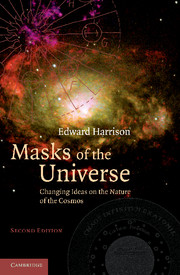1 - Introducing the Masks
Published online by Cambridge University Press: 27 October 2009
Summary
The theme of this book is that the universe in which we live, or think we live, is mostly a thing of our own making. The underlying idea is the distinction between Universe and universes. It is a simple idea having many consequences.
The Universe is everything. What it is, in its own right, independent of our changing opinions, we never fully know. It is all-inclusive and includes us as conscious beings. We are a part or an aspect of the Universe experiencing and thinking about itself.
What is the Universe? Seeking an answer is the endless quest. I can think of no better reply than the admission by Socrates: “all that I know is that I know nothing.” David Hume, a Scottish philosopher in the eighteenth century, in reply to a similar question, said “it admits of no answer” for absolute truth is inaccessible to the human mind. Logan Smith, an expatriate American living in London, expressed his reply in a witty essay Trivia (1902), “I awoke this morning … into the daylight, the furniture of my bedroom – in fact, into the well-known, often-discussed, but to my mind as yet unexplained Universe.”
The universes are our models of the Universe. They are great schemes of intricate thought – grand belief systems – that rationalize the human experience.
- Type
- Chapter
- Information
- Masks of the UniverseChanging Ideas on the Nature of the Cosmos, pp. 1 - 12Publisher: Cambridge University PressPrint publication year: 2003



